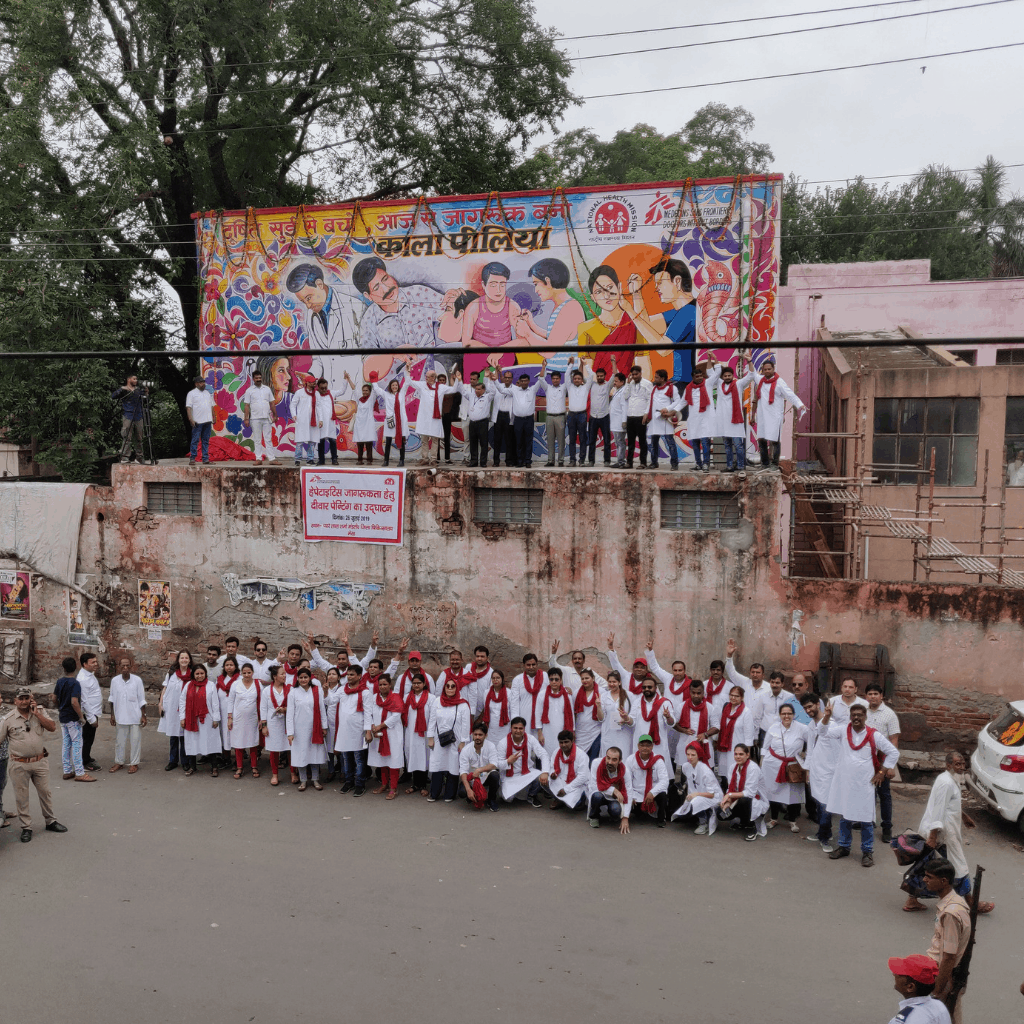Meerut: The international medical humanitarian organisation Doctors Without Borders /Médecins Sans Frontières (MSF) today observed World Hepatitis Day at the PL Sharma District Hospital in Meerut, Uttar Pradesh where MSF runs a pilot project for the treatment of Hepatitis C providing patients with free testing and treatment. MSF held a rally with patients treated at the clinic and staff to raise awareness about the disease.
MSF also unveiled a mural depicting various ways Hepatitis C is transmitted and also held a street play at the hospital on the same day. The mural was unveiled by the Shri Anil Dhingra, district magistrate of Meerut and Dr.Rajkumar, Chief Medical Officer.
MSF’s work at Hepatitis C clinic in Meerut, Uttar Pradesh
71 million people are infected with the hepatitis C virus (HCV) in the world and a vast majority of people with the disease live in China, India, Egypt and Indonesia. In Meerut, MSF has set up a programme to fight against the deadly disease. While the focus on decentralised models of care has proven effective, the organisation is also advocating for more prevention to bend the curve of the hepatitis C outbreak.
HCV is a blood-borne virus that can lead to hepatic cirrhosis, liver failure and liver cancer, as well as a range of systemic health problems. It is transmitted most commonly through:
- injectable drug use
- unsafe injection practices
- unsafe health care through informal settings
- transfusion of unscreened blood or blood products
- contaminated needle/ blade re-use during shaving, tattoo making, body piercing.
There is currently no vaccine against HCV, reduction of transmission is possible only by setting up preventive measures to reduce exposure of patients mainly through: information campaigns, strengthening hygiene and infection control measures in health facilities, safety use of medical equipment including single use of syringes.
“Diagnosing and treating hepatitis C is just one of the types of actions that can be put in place to control the disease,” explains Dr Hemant Sharma, medical referent of the MSF project in Meerut. “But there is more to be done, and prevention is the key.” Information campaigns in the community are essential in high disease burden hotspot areas like Western Uttar Pradesh to ensure that the people are aware of the transmission modes of the disease and avoid behaviours that can lead to infection or re-infection.

In August, MSF will start targeted health promotion activities in selected high burden villages, improving awareness among local leaders and sensitise key actors and service providers to the prevention of the disease. “We want all the people who can contribute to decrease the burden of Hepatitis C to know what the right behaviours to avoid contamination are. Health workers, but also barbers, tattoo and piercing makers for instance, have a very important role to play to ensure that the transmission is reduced,” continues Dr Hemant Sharma. Prevention activities will also be conducted in some schools.
Since January 2017 MSF, in collaboration with National Health Mission and PL Sharma District Hospital, has been implementing a pilot project for decentralised diagnosis and treatment of Hepatitis C in Meerut providing the patients with free testing and treatment. From January 2017 to June 2019, 3,675 patients have been put on treatment among which 2,732 have finished treatment and 2,222 been declared cured of the disease after their last test. Remaining patients are still under treatment.
✴️Unsafe injection practices
— MSF INDIA (@MSF_Ind) July 27, 2019
✴️transfusion of unscreened blood or blood products
✴️Re-using contaminated needle/ blade during shaving, tattoo making, body piercing
We unveiled a mural & performed a street play at #Meerut hospital depicting various ways #HepatitisC is transmitted pic.twitter.com/Zy4OPLi3kr
In the coming months, MSF will start handing over the activities to the National Viral Hepatitis Control Program that will scale up the access to free diagnostics and treatment for the population across the country including state of Uttar Pradesh. MSF welcomes the upcoming roll out of National Viral Hepatitis Control Program (NVHCP) in Uttar Pradesh.
The P L Sharma District Hospital has been chosen by the Ministry of Health as a ‘Treatment Centre’ for non-complicated cases and LLRM Medical College as ‘Model Treatment Centre’ for referrals of complicated cases. With the implementation of the national programme, decentralised access to testing and treatment will be available to the population. “We hope that the model we have set up will be largely replicated in the coming years and that, along with effective preventive measures, it will allow to get closer to the objective of the World Health Organization (WHO) of elimination of viral Hepatitis by 2030,” concludes Dr Hemant Sharma.











